Key takeaways:
- Encryption is vital for protecting sensitive data, enhancing trust, and preventing cybercrime.
- The debate on encryption often centers around balancing security needs with individual privacy rights.
- Future trends in encryption, such as quantum computing and homomorphic encryption, promise significant advancements but also pose challenges for adoption.
- Best practices for personal encryption include using strong standards, enabling two-factor authentication, and staying informed about cybersecurity trends.
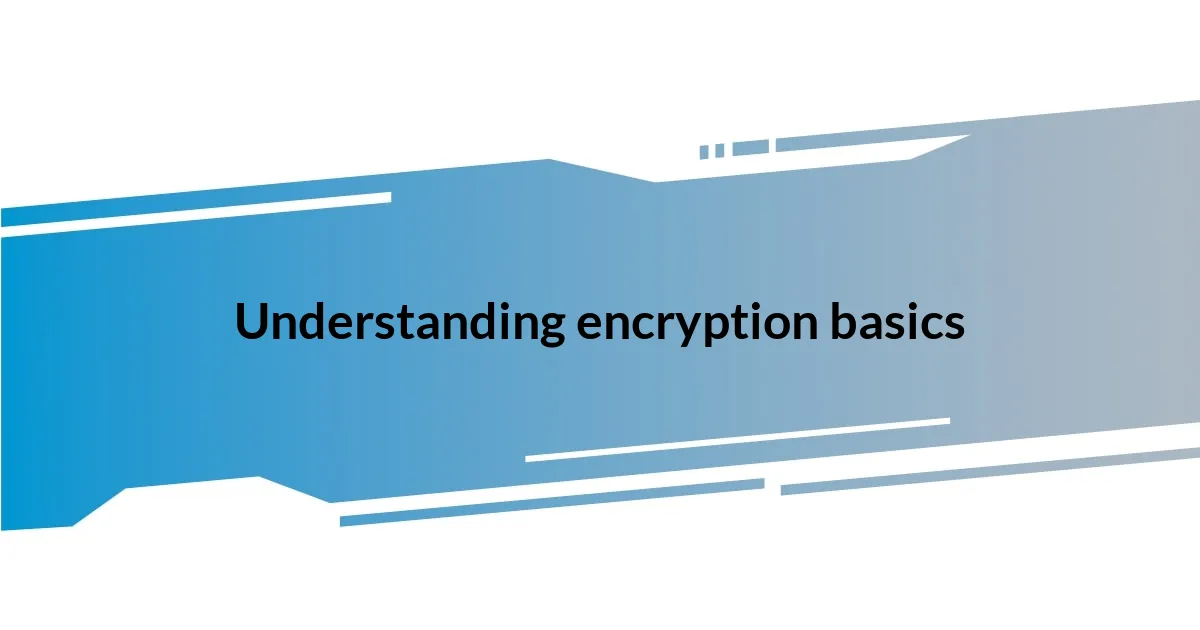
Understanding encryption basics
Encryption is essentially a way to scramble information so that only authorized parties can read it. I remember the first time I encountered encryption; I was fascinated by how something as basic as a message could be turned into a code. It made me appreciate the lengths we go to protect our privacy, especially in a world where data breaches seem all too common.
At its core, encryption relies on algorithms, which are like recipes that detail how to transform plain text into unreadable ciphertext. This process is crucial for safeguarding sensitive data, such as personal emails or credit card numbers. Have you ever stopped to think about how often you rely on encryption without even realizing it? Every time we shop online or use a banking app, we’re putting tremendous trust into these algorithms.
There are two main types of encryption: symmetric and asymmetric. Symmetric encryption uses a single key for both encryption and decryption, while asymmetric encryption employs a pair of keys, one public and one private. I find it interesting how each type has its own strengths and weaknesses. This variety allows us to choose the best method depending on our security needs, but it can also be overwhelming. The key question is, how well do we understand the implications of the encryption options available to us?
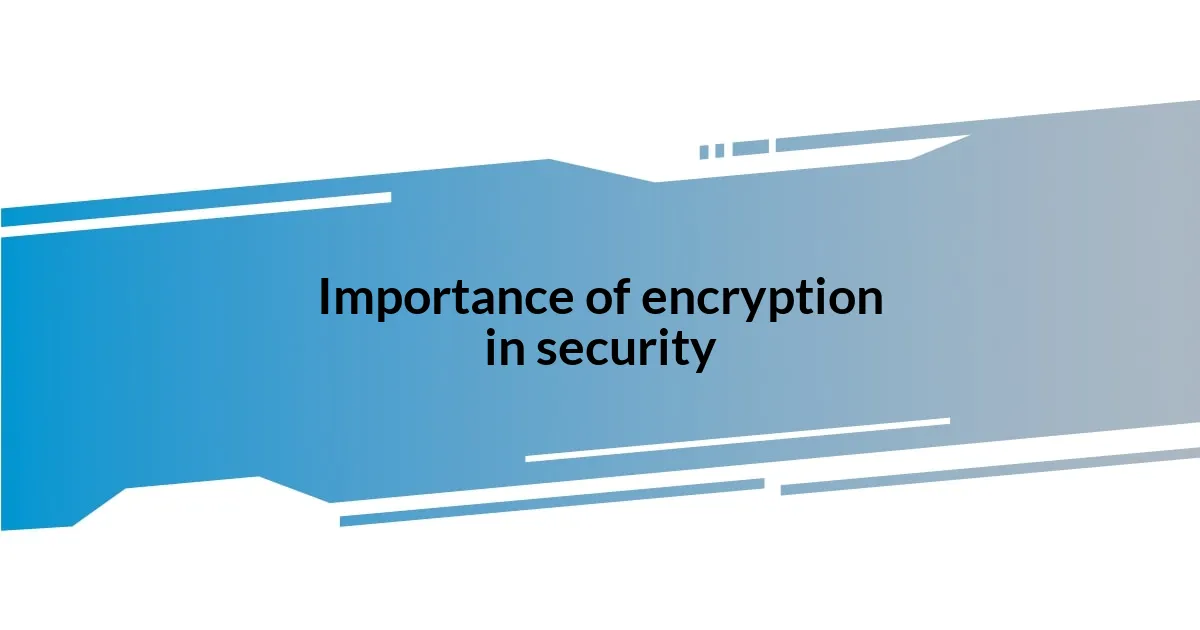
Importance of encryption in security
Encryption plays a fundamental role in enhancing our security measures. I’ve often reflected on my own experiences with online banking; knowing that my financial data is encrypted gives me a sense of safety. It’s like having a trusted vault for my information, ensuring that only I and authorized personnel can access it, even if it’s floating around the digital ether.
When we discuss the importance of encryption, several key points emerge:
- Data Protection: It safeguards sensitive information from unauthorized access.
- Trust Building: It fosters trust between users and service providers, essential for online transactions.
- Compliance: Many regulations mandate encryption to protect personal data, underscoring its legal importance.
- Prevention of Cybercrime: Effective encryption acts as a deterrent against hackers, making it harder for them to exploit our data.
- Privacy Assurance: It upholds individual privacy rights, a basic expectation in our digital interactions.
These points demonstrate why encryption is not just a technological feature but a critical cornerstone of our digital security landscape.
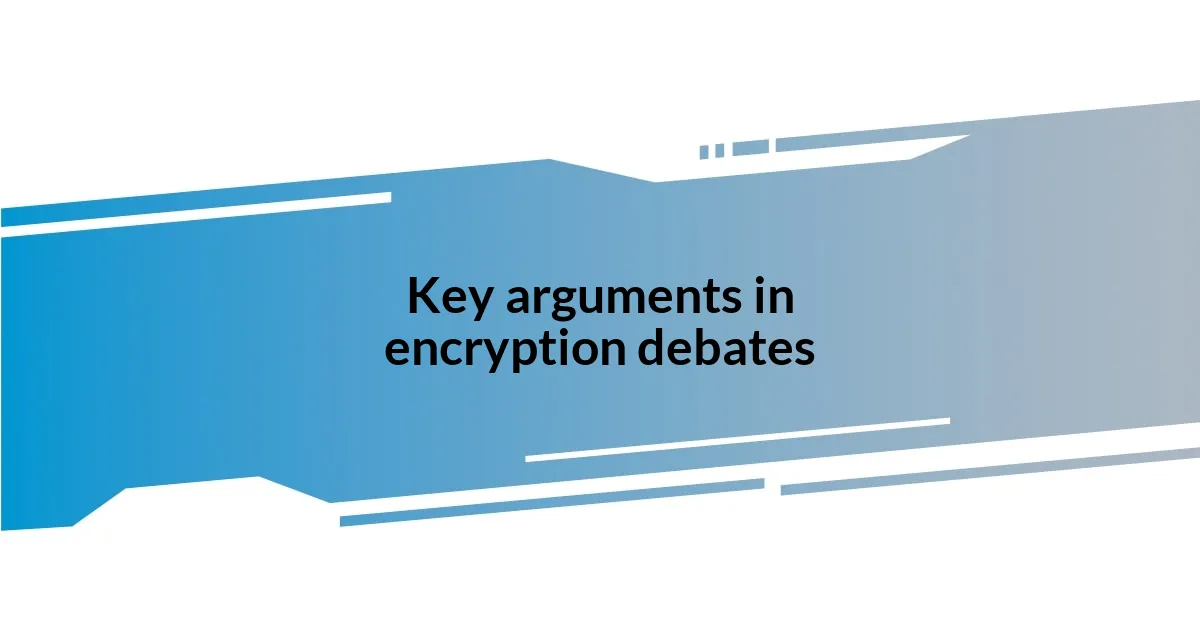
Key arguments in encryption debates
Key arguments in encryption debates often revolve around the balance between security and privacy. I recall a heated discussion at a tech conference where panelists argued whether law enforcement should have access to encrypted messages. Some believed that providing backdoor access could help catch criminals. However, from my perspective, this approach poses a significant risk; it sets a precedent that could undermine the very foundation of individual privacy. How can we truly feel secure if our encrypted conversations aren’t safe from prying eyes?
Another vital aspect to consider is the potential for technological overreach. I remember reading about instances where governments attempted to mandate weaker encryption standards in the name of national security. This raised alarms for me as an advocate for stronger privacy protections. It’s a slippery slope; once we allow certain groups to dictate encryption practices, we open the door to broader abuses of power. There’s an undeniable tension here: should user privacy take precedence over certain security needs? Every side does have valid concerns, but it’s crucial to really listen and explore the implications fully.
Finally, the debate often centers on the evolving landscape of cyber threats. With my background in cybersecurity, I’ve witnessed firsthand how quickly the tactics of malicious actors can adapt. Encryption, in its many forms, remains a key defense in protecting sensitive data against increasingly sophisticated attacks. Every time I hear about a new large-scale data breach, I can’t help but think about the vulnerabilities that could have been mitigated with proper encryption. It makes clear that while it’s essential to advocate for law enforcement capability, maintaining robust encryption for the average user should never be compromised.
| Argument | Description |
|---|---|
| Security vs. Privacy | The need for backdoors in encryption for law enforcement can compromise personal privacy. |
| Technological Overreach | Stronger regulations can lead to forced weak encryption standards, risking privacy rights. |
| Evolving Cyber Threats | As cyber threats evolve, maintaining robust encryption is critical for data protection. |
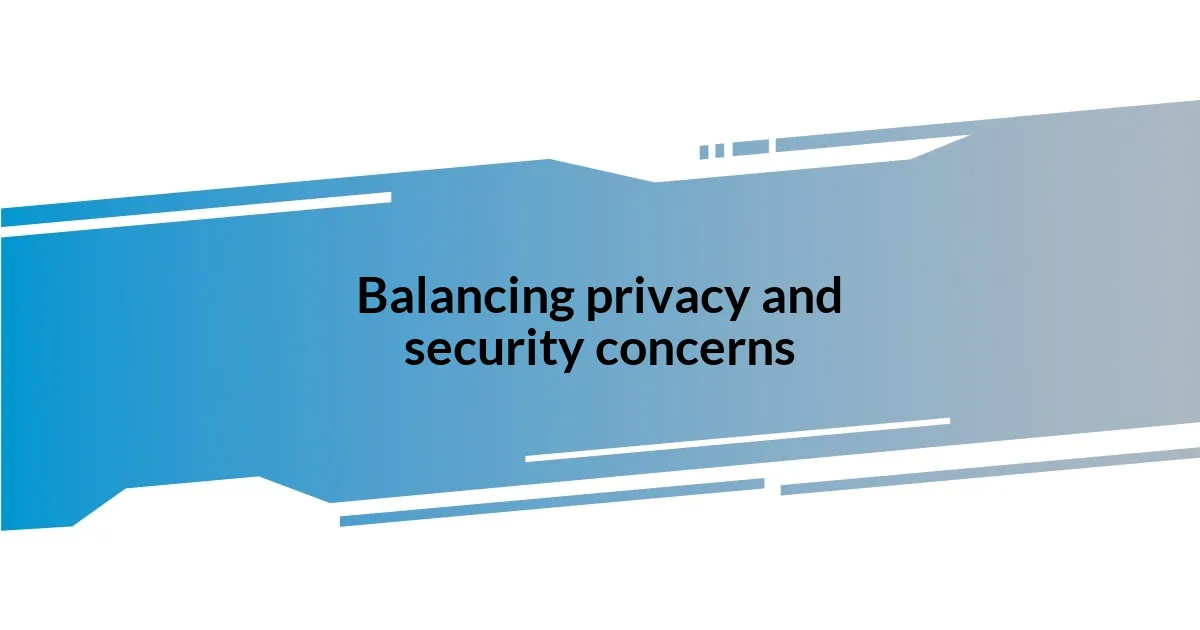
Balancing privacy and security concerns
Navigating the tightrope between privacy and security is no small task. I remember a moment when I had to explain to a friend why I choose to use end-to-end encrypted messaging apps. Their initial reaction was disbelief—didn’t I want to be safe from criminals? My response made me reflect on how essential it is for individuals to have that layer of protection, especially in an era of pervasive surveillance. It’s about empowering users while recognizing legitimate security concerns.
One incident that stands out in my mind is when a major data breach exposed millions of user accounts. It left many of my colleagues feeling vulnerable and anxious about their personal information. I find it troubling when regulators suggest that we sacrifice privacy for the illusion of better security. After all, if we give up too much privacy, who really benefits? Ironically, stronger encryption could provide a more secure environment for everyone, not just the “good guys.”
It’s heartening to see that more people are beginning to understand the importance of preserving privacy in our tech-driven lives. However, I often wonder how many of us consider the long-term consequences of weak encryption standards. Realistically, history has shown that compromising on privacy often leads to unintended consequences. I believe that our collective goal should be to foster a secure digital space while still respecting the fundamental rights we all cherish. What’s your take on this balance?
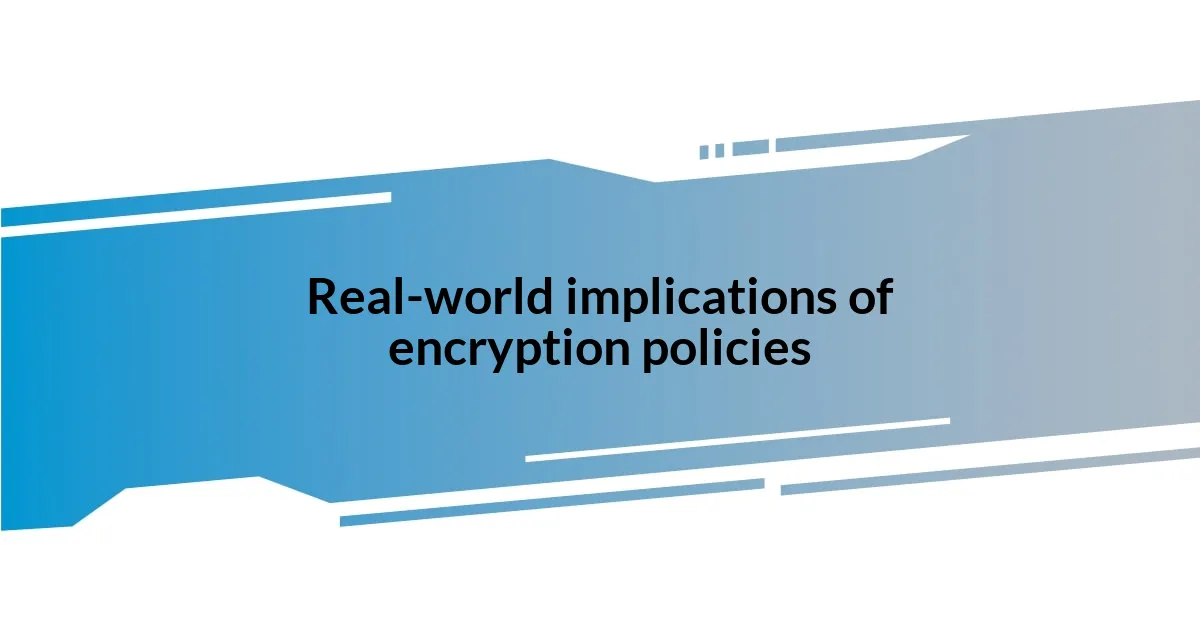
Real-world implications of encryption policies
Encryption policies have tangible effects on day-to-day life, particularly for those handling sensitive information. I can recall a time when I was working on a project involving private client data. The knowledge that encryption was in place gave me a sense of security, knowing that unauthorized individuals couldn’t easily access confidential files. However, during discussions with my peers, we pondered what would happen if lawmakers pushed for backdoors. Would I still feel that same trust in encryption? This uncertainty highlighted a crucial question: how do we safeguard our information while adhering to regulatory demands?
Moreover, I vividly remember a friend’s experience with a less secure messaging app that lacked robust encryption. One day, they received an alarming message that their account had been compromised. The panic in their voice was palpable. This incident not only affected them personally but also caused a ripple effect of distrust among their contacts. Such real-world implications demonstrate that encryption is not just a technical issue; it directly influences relationships and how people communicate. How can we expect people to feel safe sharing their thoughts if they worry about privacy invasions?
Lastly, consider the implications for businesses navigating compliance with varying encryption regulations. I once attended a workshop where a company shared their struggle to meet different regional encryption laws, which constrained their ability to innovate freely. As they explained their dilemma, I sensed a collective frustration in the room. Effectively balancing security needs while fostering a creative environment is no easy feat. Isn’t it vital for policies to be both flexible and forward-thinking to truly protect the interests of both individuals and businesses?
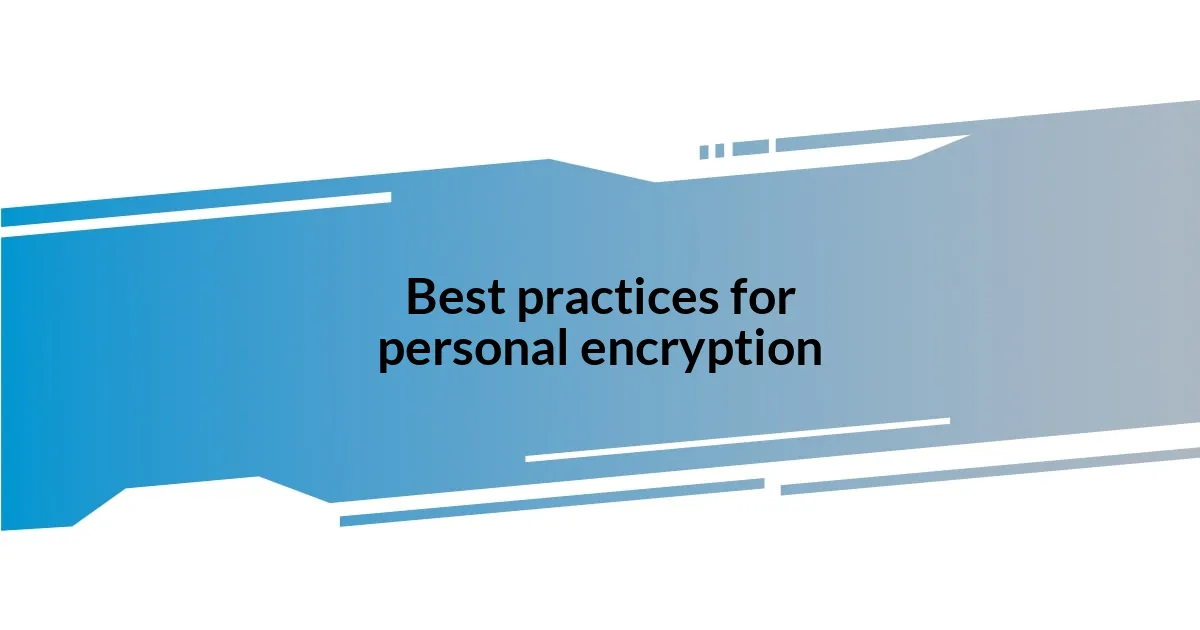
Best practices for personal encryption
Ensuring your personal encryption is robust involves a few key practices that I find particularly effective. First, always choose software that uses strong encryption standards, such as AES-256. I remember switching to a password manager that offered this encryption; it gave me peace of mind knowing my passwords were stored securely. Without such measures, you’re leaving your data vulnerable to potential breaches.
Another practice I swear by is enabling two-factor authentication (2FA) wherever possible. It’s an extra layer of security that captures my attention every time I log in. Once, I forgot my password and felt a rush of anxiety. Thankfully, 2FA saved me from a potentially disastrous situation, reinforcing my commitment to personal cybersecurity. Isn’t it worth a moment of inconvenience for the secure feeling it brings?
Finally, I strongly recommend that individuals stay updated on software and encryption technology trends. Often, I find myself reading articles or attending webinars to learn about the latest developments. This continuous education has helped me uncover vulnerabilities I didn’t know existed. How often do we overlook the importance of staying informed in a rapidly changing digital landscape? For me, the knowledge alone is a powerful tool in enhancing my security practices.
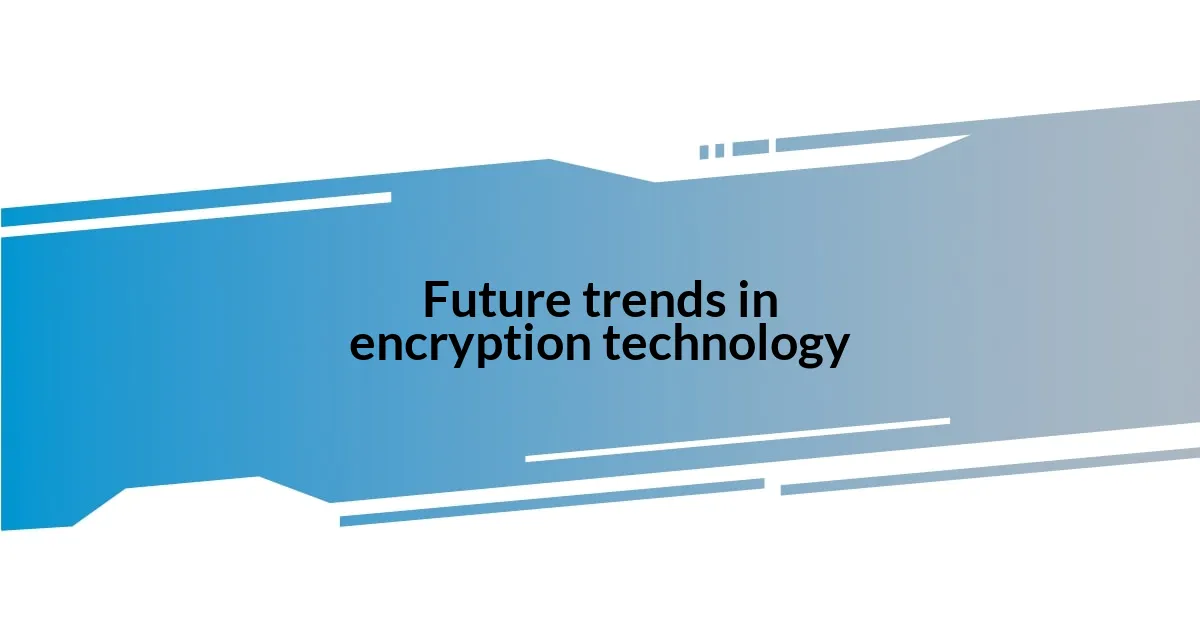
Future trends in encryption technology
As I look to the future, it’s clear that quantum computing is set to revolutionize encryption technology. I remember feeling a mix of excitement and unease when I first heard about quantum cryptography. It promises incredible advancements but also raises questions about current encryption methods being rendered obsolete. How can we, as individuals and organizations, prepare for this impending shift in security paradigms? Staying informed and adaptable seems crucial.
Another trend I’m observing is the growth of homomorphic encryption, which allows computations to be performed on encrypted data without needing to decrypt it first. I think about how empowering this could be for businesses handling sensitive information—allowing data analysis while ensuring privacy. It feels like a game changer. I’m curious, though, will organizations be ready to adopt such complex technologies, or will they hold back due to fear of implementation challenges?
Lastly, I’m increasingly aware of the role of privacy-focused tools in everyday life. Just the other day, I spoke to a friend who switched to a privacy-centric messaging app, and she shared how liberating it felt to know her conversations were secure. Imagine a future where encryption becomes the norm for everyone, not just tech-savvy individuals. Can you envision the impact that might have on our communication habits and trust in digital platforms? I genuinely believe that as more people embrace these tools, we’ll foster a culture of privacy that benefits all.